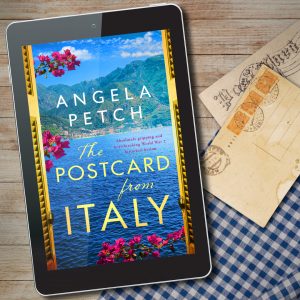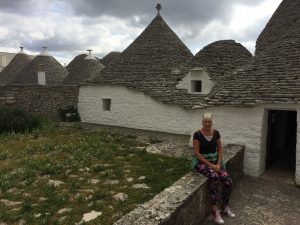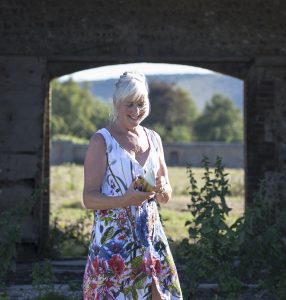Authors Interviewing Characters: Angela Petch
 Italy, 1945. ‘Where am I?’ The young man wakes, bewildered. He sees olive trees against a bright blue sky. A soft voice soothes him. ‘We saw you fall from your plane. The parachute saved you.’ He remembers nothing of his life, or the war that has torn the world apart… but where does he belong?
Italy, 1945. ‘Where am I?’ The young man wakes, bewildered. He sees olive trees against a bright blue sky. A soft voice soothes him. ‘We saw you fall from your plane. The parachute saved you.’ He remembers nothing of his life, or the war that has torn the world apart… but where does he belong?
England, present day. Antique-shop-owner Susannah wipes away a tear as she tidies her grandmother’s belongings. Elsie’s memories are fading, and every day Susannah feels further away from her only remaining family. But everything changes when she stumbles across a yellowed postcard of a beautiful Italian stone farmhouse, tucked away in Elsie’s dressing table. A message dated from World War 2 speaks of a secret love. Could her grandmother, who never talked about the past, have fallen for someone in Italy all those years ago?
With Elsie unable to answer her questions, Susannah becomes determined to track down the house and find a distraction from her grief. Arriving at what is now a crumbling hotel by the sparkling Italian sea, she feels strangely at home. And after an unexpected encounter with handsome wine waiter Giacomo, she can’t tell if it’s his dark eyes or his offer to help solve her mystery that makes her heart race.
Together they find a dusty chest tucked in a forgotten corner of the building. The white silk of a World War 2 parachute spills out. And the Royal Air Force identity tag nestled in the folds bears a familiar name…
With Giacomo by her side, and before it’s too late for her grandmother, can Susannah discover the truth behind a shocking wartime secret at the heart of her family? Or will it tear her apart?
An absolutely stunning page-turner that will sweep you away to the olive groves and majestic views of the Italian coast. Perfect for fans of Kathryn Hughes, Fiona Valpy and Victoria Hislop.
—
Angela Petch Interviews Roberto Bruni
[For the purposes of this article, I = interviewer and R = Roberto]
I Thank you so much, Signor Roberto, for letting me chat today. First of all, I have to tell you how much I love your home. I’ve never been inside a trullo before. It’s enchanting.
R – I didn’t know about trulli either until I woke up inside one. Now, I think I’d find it hard to live in an ordinary house. The walls are very thick and insulate against the heat as well as the cold. They were designed to be dismantled quickly in the days when poor farmers (contadini) could be taxed for living in them. But, ha ha! you can’t tax a pile of stones in the middle of a field. I have some pictures here of how the contadini furnished their trulli in years gone by. We installed mod cons, so we no longer have to… put it this way: ‘fertilise the fields’.
 I You say you woke up inside a trullo. What do you mean?
I You say you woke up inside a trullo. What do you mean?
R – Precisely what I said. It was spring 1945 and I literally woke up inside the room where we are sitting now. I was on a bed and my hands were heavily bandaged. And I had such a headache. An old man and a young boy tended to me and I had no idea who I was or where I’d come from.
I That must have been very frightening.
R Strangely, I wasn’t afraid. I knew I was amongst friends. I could sense it in the way I was looked after and the tender care shown me. The courage of those two ordinary people, despite a war being waged on their land, was truly amazing. If the Germans or the fascist police had discovered they were sheltering me, they would have been shot on the spot. I literally owe my life to them.
I How long was it before you knew who you were?
R Oh, a long, long time. Several months, in fact. At times, I would have flashes of memory, but not enough to piece the fragments together. In the meantime I went native and helped as much as I could about the place as I grew stronger. The old man was a fisherman and the young boy cooked and tended to the land. I was clumsy and of little use at first, if I’m honest. It was very obvious that whoever I’d been before, I was not a country lad. But I learned to help them fish. I repaired their trabucco and as I was stronger than both of them, I was able to carry out the heavier tasks.
I Trabucco? What does that mean.
 R We can go for a stroll down to the beach after we’ve eaten. I’ll show you our trabucco. It’s a fishing platform that stands in the shallows. We lower a large net by turning a pulley when the tide is right and catch fish in it. You’re eating some of this morning’s catch right now. Sea bream, sardines and mussels. Do you like the salad? We call it panzanella.
R We can go for a stroll down to the beach after we’ve eaten. I’ll show you our trabucco. It’s a fishing platform that stands in the shallows. We lower a large net by turning a pulley when the tide is right and catch fish in it. You’re eating some of this morning’s catch right now. Sea bream, sardines and mussels. Do you like the salad? We call it panzanella.
I It’s all delicious. What is the main ingredient? Cous cous?
R No, signorina. It’s old bread soaked in water, squeezed dry and then oil, vinegar, fresh tomatoes, cucumbers and basil are added. Some families add tuna and capers but we prefer to keep it simple. Waste not, want not.
I Tell me, Signor Roberto, you speak really good English. I know something of your background, so I know where you were born. But you’ve lived in Puglia now for most of your life. Where do you feel most at home?
R Where do you think? Look around you at our olive and almond trees. Look at our vegetable garden brimming with fresh tomatoes, aubergines, courgettes. And the hens that provide eggs for our home-made pasta. Look at our sky, as blue as a child’s painting. Do I look stressed? Home is where the heart is. And my heart is here. And when my wife and children return from their walk along the beach, you will understand how complete my life is. This is where I belong.
I Is there nothing you miss at all from the country where you were born?
R The only family I have now is here. And anyway – what would I miss? I was born near the sea, that’s true. But the sea over there was grey most of the year and I lived in a busy town. I helped my parents in their restaurant. There were always too many people around. My parents are dead now.
We say in Italian, “tutto il mondo è paese”. Basically, people are the same the world over. We are all part of the same human race. We all have to survive in the same ways: we sleep, work, put food in our mouths. If I hadn’t landed up on the Puglia shore like I did, I may have led a different life in England. I would have got on with it. But fate had something else in store for me. I thank God every day for the way it has worked out. Now, let’s walk down the path and you can have a dip from the beach.
I I have so many questions to ask you. I hardly know where to begin.
R It would be easier if you read the book my granddaughter wrote about my life, For now, signorina, listen to the sea and the birds, breathe in the salty air and after you have dived from the rocks, we can talk some more.
I Grazie, Roberto.
R Prego, signorina.
—
 Angela Petch is an award-winning and bestselling writer of fiction – plus the occasional poem.
Angela Petch is an award-winning and bestselling writer of fiction – plus the occasional poem.
Every summer she moves to Tuscany for six months where she and her husband own a renovated watermill which they let out. When not exploring their unspoilt corner of the Apennines, she disappears to her writing desk at the top of a converted stable. In her Italian handbag or hiking rucksack she always makes sure to store notebook and pen to jot down ideas.
The winter months are spent in Sussex where most of her family live. When Angela’s not helping out with grandchildren, she catches up with writer friends.
Blog: https://angelapetchsblogsite.wordpress.com
Facebook: https://www.facebook.com/AngelaJaneClarePetch
Twitter: https://twitter.com/Angela_Petch
Category: On Writing

























